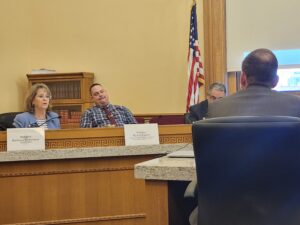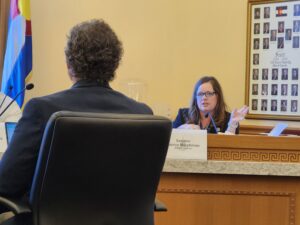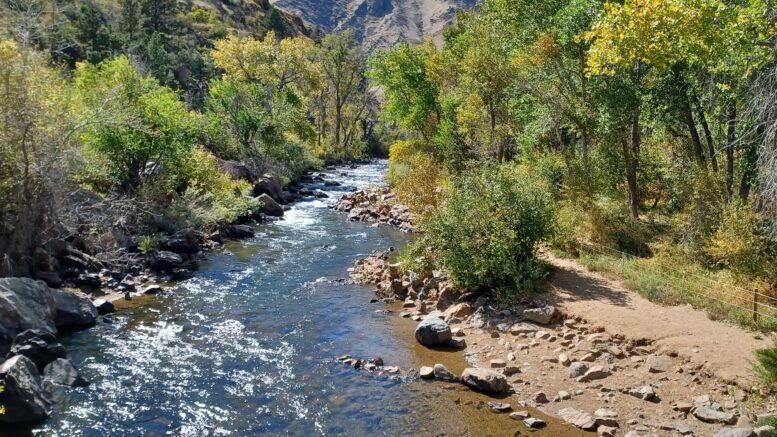Eleven months after the U.S. Supreme Court limited the scope of waterways over which the federal government has Clean Water Act jurisdiction, Colorado legislators are debating two very different proposals that could affect industries ranging from utilities to construction.
The bills — both of which have passed their initial committees — seek to create a dredge-and-fill permitting system that gives the state oversight of companies digging up or filling materials into wetlands or surface waters as part of construction projects. The Democrat-sponsored House Bill 1379 offers protections to a broader group of waterways and is favored by environmental groups, while the bipartisan Senate Bill 127 draws a brighter line over what is protected and is backed by Colorado Water Congress.
The U.S. Army Corps of Engineers oversaw dredge-and-fill permitting in Colorado and most states until the Supreme Court in May 2023 ruled only wetlands with continuous surface connections to federally protected bodies of water are regulated by the Clean Water Act. That removed protections for about 60% of previously regulated Colorado waters, and, after the state enacted a temporary rule for its wetlands and streams, left officials scrambling to install a permanent program to oversee permits and guard its waters.
One idea, two different approaches
SB 127, introduced in January by Republican Sen. Barbara Kirkmeyer of Brighton and Democratic Rep. Shannon Bird of Westminster, would set up a “gap” waters program in which the state takes on permitting for areas no longer covered by the Corps of Engineers. It defines those as waters within 1,500 feet on each side of streams, waters within a 100-year flood plain and low and marshy fens.

Colorado state Sens. Barbara Kirkmeyer and Byron Pelton listen as natural-resources attorney Adam DeVoe testifies on Kirkmeyer’s Senate Bill 127 on April 11.
HB 1379 — introduced in mid-March by House Speaker Julie McCluskie, D-Dillon, and Rep. Karen McCormick, D-Longmont — takes a “state waters” approach that regulates most wetlands in Colorado — an estimated 25% expansion on what the feds previously oversaw. It creates a new system of general and individual permits, promising 45-day turnaround on the broader and less invasive work overseen by general permits and more focused oversight of individual permits, requiring a “least damaging practicable alternative” plan.
While HB 1379 puts the new permitting program in the Colorado Water Quality Control Division — a move estimated to require $600,000 initial investment and 4.7 full-time-equivalent employees — SB 127 creates a new Stream and Wetlands Protection Division. The new division would cost some $3.8 million to set up and demand 23 workers, though Kirkmeyer said its budget would be funded at roughly 50% levels by future permitting.
Both bills exempt normal farming and ranching activities and erosion-control practices, but SB 127 also exempts agricultural and municipal ditches and waters without proven hydrological connections to other waters. Kirkmeyer told the Senate Agriculture & Natural Resources Committee: “I don’t think every drop of water should be covered.”
Concerns from business, Water Congress leaders
While there are other differences, proponents and opponents focus most of their arguments on whether it’s proper for the state to ramp up previous protections to preserve and protect water in this arid climate or whether doing so would harm the economy.
Gabe Racz, an attorney and the water-quality committee chairman for the Colorado Water Congress, said HB 1379 injures current water-rights holders by requiring permit seekers to defend their purpose of their activities and offer less invasive alternatives. It gives the state jurisdiction over ditches and other areas previously determined not to need protection and will create confusion in the water community by expanding current authority.

Water attorney Gabe Racz speaks during a Zoom meeting on water issues.
“It is problematic to have a state program that is now going to regulate substantially more waters than were regulated under the Clean Water Act,” Racz told the House Agriculture, Water & Natural Resources Committee during an April 8 hearing on HB 1379. “It’s not appropriate to expand the scope.”
Environmentalists favor House water bill
But McCormick argued that HB 1379 uses a 60-year-old definition of waters regulated by the state to determine its scope and provides for ranchers, construction firms and water advocates the certainty that each said they wanted from the new state law. Meanwhile, environmental advocates say SB 127 is too permissive, leaving anything 1,501 feet from a stream unprotected while allowing for a cost-benefit analysis on permit provisions rather than offering needed protections to limit some activities.
“Senate Bill 127 draws a distinct line … This bill requires environmental review because we’ve lost 50% of our state wetlands (in the past 150 years),” Josh Kuhn, Conservation Colorado water campaign manager, told the House Finance Committee Monday before it passed HB 1327 to the House Appropriations Committee on a Democrat-led party-line vote. “If there are a couple more permits that need to be analyzed because of the Supreme Court’s decision, then that’s a necessary step to take.”
One major difference between the bills was that SB 127 put the new permitting program in the Colorado Department of Natural Resources, while HB 1327 put it under the Water Quality Control Division in the Colorado Department of Public Health and Environment.
SB 127 advocates had noted that DNR has dealt with the Army Corps of Engineers on decisions regarding wetlands for decades and that the WQCD has had permitting backlogs stretching for years at times, leaving it unprepared to take on new duties. But Kuhn noted the Legislature last year gave the Colorado Water Quality Control Commission the ability to raise fees on existing permits to take care of staffing shortages, and McCluskie argued that division handles 11,000 permits annually while DNR does no permitting.
Surprise amendment saves SB 127

Colorado state Sen. Janice Marchman asks a question to Josh Kuhn, Conservation Colorado water campaign manager, during an April 11 committee hearing.
However, in a twist at the end of Thursday’s Senate committee hearing on SB 127, Democratic Sen. Janice Marchman of Loveland amended that bill to move the new division under CDPHE, albeit while continuing to allow creation of the new standalone program. The amendment likely saved SB 127 from going down to defeat — it passed the committee by one vote — and continued debate over how wide the state’s regulatory scope should be.
“We have two competing bills at play, and we continue to hear that two bills in the system at the same time is a problem. I agree, but I don’t think either bill is there yet,” said Marchman, explaining that she likes having CDPHE’s scientific expertise on the subject but feels HB 1379 creates a lack of clarity around regulation and has an unrealistically low fiscal note. “The answer has got to be somewhere between these two bills.”
At stake for Kirkmeyer and other SB 127 proponents is guardrails on the state’s regulatory authority that, if not placed carefully, could inhibit the construction of the additional housing that leaders from both parties say is needed to tackle the affordability crisis. Roads, bridges, housing developments, flood mitigation and utility pipelines all must receive dredge-and-fill permits, McCluskie and McCormick noted when they introduced HB 1327 last month.
Future of water bills
HB 1327 backers, meanwhile, say increasing protections for all Colorado wetlands and ensuring adequate water supplies is vital for water-heavy industries ranging from agriculture to outdoor recreation to brewing. But it’s also vital, McCluskie estimated, that the cost of the new program fits within the $600,000 placeholder that Gov. Jared Polis requested in the budget for it, lest it pull funding from other needed programs.
The path for HB 1379, which has the support of McCluskie and Polis, is clearer. SB 127 is likely to have a hard time getting through the Senate without the support of key moderate Democratic Sen. Dylan Roberts of Frisco, who voted against it in committee and is sponsoring HB 1379 in that chamber.
However, SB 127 already vaulted one hurdle that it was deemed unlikely to clear. And it’s obvious that the question of how to protect Colorado’s waters while also ensuring that construction and utility expansion are not obstructed by regulations on wetland use is an issue that is crossing party lines.
